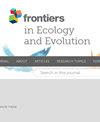Can beavers help improve terrestrial invertebrate diversity?
IF 2.4
3区 环境科学与生态学
Q2 ECOLOGY
引用次数: 0
Abstract
On a global scale, species biodiversity is declining rapidly, including that of terrestrial invertebrates. Environmental heterogeneity is viewed as a key factor promoting biodiversity, and previous studies have shown how beavers can have a profound effect on both habitat heterogeneity and abundance and diversity of a plethora of water-related and terrestrial organisms. However, less is known about the effects of beavers and successional stages on the terrestrial invertebrate community. Here, we review existing knowledge and outline research trajectories to improve our understanding of how beavers affect the terrestrial invertebrate community with special focus on the importance of each successional stage that beavers provide on terrestrial invertebrates. Although beavers can have a large impact on the terrestrial invertebrate community, more studies are needed that take into consideration successional stages and with standardized sampling designs. A better understanding of how beaver activity affects the terrestrial invertebrate community can help in conservation of endangered species and restoration of biodiversity in terrestrial habitats.海狸能否帮助改善陆生无脊椎动物的多样性?
在全球范围内,物种的生物多样性正在迅速减少,包括陆生无脊椎动物。环境的异质性被认为是促进生物多样性的关键因素,以往的研究表明,海狸对栖息地的异质性以及大量与水有关的生物和陆地生物的丰度和多样性都有深远的影响。然而,海狸和演替阶段对陆生无脊椎动物群落的影响却鲜为人知。在此,我们回顾了现有的知识,并概述了研究轨迹,以加深我们对海狸如何影响陆生无脊椎动物群落的理解,并特别关注海狸提供的每个演替阶段对陆生无脊椎动物的重要性。尽管海狸会对陆生无脊椎动物群落产生巨大影响,但还需要更多考虑到演替阶段并采用标准化取样设计的研究。更好地了解河狸活动如何影响陆生无脊椎动物群落,有助于保护濒危物种和恢复陆生栖息地的生物多样性。
本文章由计算机程序翻译,如有差异,请以英文原文为准。
求助全文
约1分钟内获得全文
求助全文
来源期刊

Frontiers in Ecology and Evolution
Environmental Science-Ecology
CiteScore
4.00
自引率
6.70%
发文量
1143
审稿时长
12 weeks
期刊介绍:
Frontiers in Ecology and Evolution publishes rigorously peer-reviewed research across fundamental and applied sciences, to provide ecological and evolutionary insights into our natural and anthropogenic world, and how it should best be managed. Field Chief Editor Mark A. Elgar at the University of Melbourne is supported by an outstanding Editorial Board of international researchers. This multidisciplinary open-access journal is at the forefront of disseminating and communicating scientific knowledge and impactful discoveries to researchers, academics and the public worldwide.
Eminent biologist and theist Theodosius Dobzhansky’s astute observation that “Nothing in biology makes sense except in the light of evolution” has arguably even broader relevance now than when it was first penned in The American Biology Teacher in 1973. One could similarly argue that not much in evolution makes sense without recourse to ecological concepts: understanding diversity — from microbial adaptations to species assemblages — requires insights from both ecological and evolutionary disciplines. Nowadays, technological developments from other fields allow us to address unprecedented ecological and evolutionary questions of astonishing detail, impressive breadth and compelling inference.
The specialty sections of Frontiers in Ecology and Evolution will publish, under a single platform, contemporary, rigorous research, reviews, opinions, and commentaries that cover the spectrum of ecological and evolutionary inquiry, both fundamental and applied. Articles are peer-reviewed according to the Frontiers review guidelines, which evaluate manuscripts on objective editorial criteria. Through this unique, Frontiers platform for open-access publishing and research networking, Frontiers in Ecology and Evolution aims to provide colleagues and the broader community with ecological and evolutionary insights into our natural and anthropogenic world, and how it might best be managed.
 求助内容:
求助内容: 应助结果提醒方式:
应助结果提醒方式:


